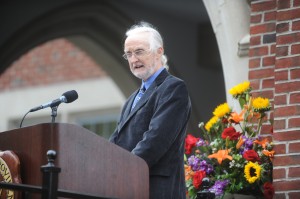We are in the business of believing in, and promoting, things that don’t yet exist. Julie Schumacher, Dear Committee Members
Today is the antepenultimate day of August. August is one of my favorite months because I am a college professor. August is very quiet on campus—no classes, few hosted events, few visitors other than prospective students and their parents taking tours. I can work out at the gym without competing for equipment and enjoy observing the various construction sites on campus without dealing with tons of people. It’s all a wonderful period of solitude; but just as Louis XV reportedly commented in anticipation of the Revolution that would cost his grandson Louis XVI his head, August says to the academic “après moi le deluge.” Before long, the floodgates will open. They’re baaack . . .!

Indeed, the floodgates opened yesterday–the first day of the new semester. This is great news; I’m more than ready to be back in the classroom. I’m not one of those professors who regularly moans and complains about their students; they are the reason I am in the profession to begin with, they keep me young (at heart if not in outward appearance), and let’s be practical: for an academic, a world sans students would be a world sans paycheck.
I got a fictional look at the dark side of academic attitudes about students, fellow faculty, administrators, and reality in general when reading Julie Schumacher’s Dear Committee Members not long ago. Billed by Amazon as “A novel that puts the pissed back in epistolary,” it follows Jason Fitger, Professor of Creative Writing at Payne University, from the beginning to the end of an academic year through the exclusive lens of letters and emails of reference and support written for current and former students, colleagues, and acquaintances from graduate school days. Billed by reviewers as “funny as hell,” “hilarious,” “fun-as-heck,” and “funny and lacerating,” I must confess that although I smiled occasionally, I found the novel more sad than anything else. Sad because I know that the never-ending bureaucratic and pedagogical challenges of the academic life can turn someone into a jaded, sarcastic, and cynical curmudgeon like Jake Fitger (he’s four years younger than I am), and even sadder because it doesn’t have to be that way.
Fitger is the graduate product of what he calls the “Seminar,” a graduate writing program that sounds a great deal like the Iowa Writers’ Workshop (which produced a few of my friends and colleagues—and none of them are like Fitger). After a reasonably successful first novel, followed by a couple more that fell still-born from the press, he finds himself in the final decade or so of a mediocre career at a mediocre public university in an English department whose infrastructure, both psychological and physical, is falling apart.
As faculty lines are closed down and the plumbing in the men’s bathroom fails, the Economics Department on the floor directly above is being treated to a complete upgrade of facilities. Fitger is the embodiment of what is actually happening across the country in more universities and colleges than I care to consider—the neglect and downsizing of the humanities while departments and programs perceived as job-producers and money-makers receive the lion’s share of funding and attention.
I am extraordinarily fortunate and privileged to have spent the last twenty-two years (and hopefully the next fifteen or twenty) at an institution that consciously attempts to swim against that tide. Accordingly, Fitger is for me the fictional embodiment of what could have happened had I not been as fortunate. I have few cynical and dedicated negative bones in my body, but some might have been created had I lived the professional life of Jason Fitger. Of course, many of the most problematic aspects of Fitger’s life are self-created. He is hated across campus for various justifiable reasons, his marriage to a fellow professor on campus fell apart when she became aware of his continuing infidelities with an administrative assistant, and his affair with the administrative assistant ends when he accidentally hits the “Send All” button on an email intended for one individual in which he expresses his continuing sexual attraction for his ex-wife that remains strong even after five years of divorce.
I don’t know anyone on campus like Jason Fitger (although he might be lurking somewhere). But hidden like buried treasure underneath page upon page of sarcasm and nastiness are occasional and brief homages to the academic life that I was surprised and pleased to find. In an email to a former colleague from the Seminar, an epistle drenched in anger, regret and bitterness, Fitger steps back for a moment.
The stately academic career featuring black-robed professors striding confidently across the campus square is already fading; and, though I’ve often railed against its eccentricities, I want to proclaim here that I believe our mission and our way of life to have been admirable and lovely, steeped with purpose and worth defending.
Amen to that. I only get to wear black robes a couple of times a year (including yesterday afternoon at Convocation)—although it would be sort of cool to wear them all of the time—and I agree that the eccentricities of the academic process and of academics themselves can be a pain in the ass. But what a wonderful profession. It’s the best thing going, not because of money, fame, or notoriety (which come to only a miniscule percentage), but because of the privilege of making a living in the midst of the most exciting environment imaginable—the life of continual learning.  As I noted in my remarks at the dedication of our new humanities building almost four years ago, the Apostle Paul’s words ring true at this time of year for every academic: Old things are passed away; behold, all things are become new. And Jason Fitger knows it, in spite of himself:
As I noted in my remarks at the dedication of our new humanities building almost four years ago, the Apostle Paul’s words ring true at this time of year for every academic: Old things are passed away; behold, all things are become new. And Jason Fitger knows it, in spite of himself:
There is nothing more promising or hopeful than the start of the academic cycle: another chance for self-improvement, for putting into practice what one has learned—or failed to learn—during the previous year.
They’re baaack . . . and I’ve been waiting for them. Bring it on.













